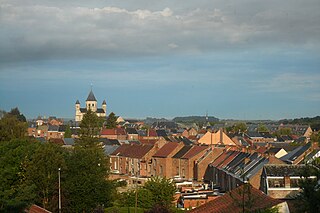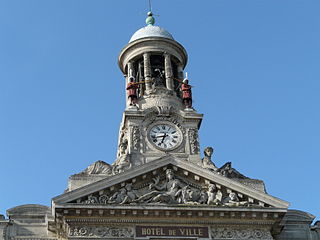Life
His birthplace is unknown, but he served in Cambrai as a choirboy. He lived in Cambrai most of his life, only leaving to attend the university in Leuven, where he was present from 1522 until 1526. In 1527 he became master of the choirboys at the Cambrai cathedral, a position which typically included housing and boarding them in addition to teaching them music. Several times he was fired from his job, but always re-hired again, usually for failing to discipline his charges but also for poor bookkeeping.

Leuven or Louvain is the capital of the province of Flemish Brabant in Belgium. It is located about 25 kilometres east of Brussels. The municipality itself comprises the historic city and the former neighbouring municipalities of Heverlee, Kessel-Lo, a part of Korbeek-Lo, Wilsele and Wijgmaal. It is the eighth largest city in Belgium and the fourth in Flanders with more than 100,244 inhabitants.
Lupi had an unnamed chronic illness which plagued him increasingly in the 1530s—he had to leave his position because of it in 1535—and which caused his early death.
Style and influence
All of his surviving music is a cappella vocal. Only two masses survive, but he wrote numerous motets and chansons; the motets were collected and printed in 1542 by Pierre Attaingnant. One noteworthy work is his setting of Ergone conticuit, the lament on the death of Johannes Ockeghem written by Erasmus.
A cappella music is specifically group or solo singing without instrumental accompaniment, or a piece intended to be performed in this way. It contrasts with cantata, which is usually accompanied singing. The term "a cappella" was originally intended to differentiate between Renaissance polyphony and Baroque concertato style. In the 19th century a renewed interest in Renaissance polyphony coupled with an ignorance of the fact that vocal parts were often doubled by instrumentalists led to the term coming to mean unaccompanied vocal music. The term is also used, albeit rarely, as a synonym for alla breve.

The mass, a form of sacred musical composition, is a choral composition that sets the invariable portions of the Eucharistic liturgy to music. Most masses are settings of the liturgy in Latin, the liturgical sacred language of the Catholic Church's Roman liturgy, but there are a significant number written in the languages of non-Catholic countries where vernacular worship has long been the norm. For example, there are many masses written in English for the Church of England. Musical masses take their name from the Catholic liturgy called "the mass" as well.
In western music, a motet is a mainly vocal musical composition, of highly diverse form and style, from the late medieval era to the present. The motet was one of the pre-eminent polyphonic forms of Renaissance music. According to Margaret Bent, "a piece of music in several parts with words" is as precise a definition of the motet as will serve from the 13th to the late 16th century and beyond. The late 13th-century theorist Johannes de Grocheo believed that the motet was "not to be celebrated in the presence of common people, because they do not notice its subtlety, nor are they delighted in hearing it, but in the presence of the educated and of those who are seeking out subtleties in the arts".
Stylistically his music was related to that of Nicolas Gombert, and showed the typical tendencies of the generation after Josquin with its densely textured polyphony and rich imitation, but Lupi remained extraordinarily sensitive to text-setting, being able to present clearly understandable words even in eight-part counterpoint. His chansons are particularly notable for their wide range of subject matter, from the serious to the bawdy.
Nicolas Gombert was a Franco-Flemish composer of the Renaissance. He was one of the most famous and influential composers between Josquin des Prez and Palestrina, and best represents the fully developed, complex polyphonic style of this period in music history.

In music, imitation is the repetition of a melody in a polyphonic texture shortly after its first appearance in a different voice. The melody may vary through transposition, inversion, or otherwise, but retain its original character. The intervals and rhythms of an imitation may be exact or modified; imitation occurs at varying distances relative to the first occurrence, and phrases may begin with voices in imitation before they freely go their own ways.

In music, counterpoint is the relationship between voices that are harmonically interdependent (polyphony) yet independent in rhythm and contour. It has been most commonly identified in the European classical tradition, strongly developing during the Renaissance and in much of the common practice period, especially in the Baroque. The term originates from the Latin punctus contra punctum meaning "point against point".
Lupi is sometimes confused with several other musicians of the 16th century. Johannes Lupi was the name of two other obscure figures, neither of whom was a composer. One was active at Nivelles, the other at Antwerp, both in the first half of the century. In addition, there was a composer named Lupus, often referred to by contemporary musicologists as the "Italian Lupus", whose works survive in the Medici Codex; another composer named Lupus Hellinck, who may be the same as the "Italian Lupus"; and an entire family of musicians named Lupo. Of this family, only Ambrose Lupo, of Milan, was active in the early 16th century. Yet another Lupi, Didier Lupi Second, worked in Lyons around the middle of the century.

Nivelles is a Walloon city and municipality located in the Belgian province of Walloon Brabant. The Nivelles municipality includes the old communes of Baulers, Bornival, Thines, and Monstreux.

Antwerp is a city in Belgium, and is the capital of Antwerp province in Flanders. With a population of 520,504, it is the most populous city proper in Belgium, and with 1,200,000 the second largest metropolitan region after Brussels.
The Medici Codex of 1518 is a music book prepared for the Pope Leo X, the second son of Lorenzo the Magnificent of the Medici family, who was pope from 1513 to 1521.

Josquin des Prez, often referred to simply as Josquin, was a French composer of the Renaissance. His original name is sometimes given as Josquin Lebloitte and his later name is given under a wide variety of spellings in French, Italian, and Latin, including Iosquinus Pratensis and Iodocus a Prato. His motet Illibata Dei virgo nutrix includes an acrostic of his name, where he spelled it "Josquin des Prez". He was the most famous European composer between Guillaume Dufay and Giovanni Pierluigi da Palestrina, and is usually considered to be the central figure of the Franco-Flemish School. Josquin is widely considered by music scholars to be the first master of the high Renaissance style of polyphonic vocal music that was emerging during his lifetime.

Johannes Ockeghem was the most famous composer of the Franco-Flemish School in the last half of the 15th century, and is often considered the most influential composer between Guillaume Dufay and Josquin des Prez. In addition to being a renowned composer, he was also an honored singer, choirmaster, and teacher.

Guillaume Du Fay was a Franco-Flemish composer of the early Renaissance. A central figure in the Burgundian School, he was regarded by his contemporaries as one of the leading composers in Europe in the mid-15th century.
His uniquely contrapuntal and complex motet "Nuper rosarum flores" demonstrates the influential exchange of musical ideas among artists around the world during the early Renaissance period.

Adrian Willaert was a Netherlandish composer of the Renaissance and founder of the Venetian School.
He was one of the most representative members of the generation of northern composers who moved to Italy and transplanted the polyphonic Franco-Flemish style there.
Antoine Brumel was a French composer. He was one of the first renowned French members of the Franco-Flemish school of the Renaissance, and, after Josquin des Prez, was one of the most influential composers of his generation.

The Burgundian School was a group of composers active in the 15th century in what is now northern and eastern France, Belgium, and the Netherlands, centered on the court of the Dukes of Burgundy.
Jean Richafort was a Netherlandish composer of the Renaissance.
Antoine de Févin was a Franco-Flemish composer of the Renaissance. He was active at the same time as Josquin des Prez, and shares many traits with his more famous contemporary.
Robert de Févin was a French composer of the Renaissance. He was the brother of Antoine de Févin, a considerably more famous composer at the court of Louis XII of France. Whether he was older or younger than Antoine is not known.
Gaspar van Weerbeke was a Netherlandish composer of the Renaissance. He was of the same generation as Josquin des Prez, but unique in his blending of the contemporary Italian style with the older Burgundian style of Dufay.
Pierre Certon was a French composer of the Renaissance. He was a representative of the generation after Josquin and Mouton, and was influential in the late development of the French chanson.
Mathieu Gascongne was a French composer of the Renaissance. Contemporaries, such as Adrian Willaert grouped him with Josquin, Ockeghem, and Jean Mouton as among the finest composers of the time. Compared with those others, however, little of his output has survived.
Nicolas Grenon was a French composer of the early Renaissance. He wrote in all the prevailing musical forms of the time, and was a rare case of a long-lived composer who learned his craft in the late 14th century but primarily practiced during the era during which the Renaissance styles were forming.
Johannes Regis was a Netherlandish composer of the Renaissance. He was a well-known composer at the close of the 15th century, was a principal contributor to the Chigi Codex, and was secretary to Guillaume Dufay.
Claudin de Sermisy was a French composer of the Renaissance. Along with Clément Janequin he was one of the most renowned composers of French chansons in the early 16th century; in addition he was a significant composer of sacred music. His music was both influential on, and influenced by, contemporary Italian styles.
Johannes Ghiselin (Verbonnet) was a Flemish composer of the Renaissance, active in France, Italy and in the Low Countries. He was a contemporary of Josquin des Prez, and a significant composer of masses, motets, and secular music. His reputation was considerable, as shown by music printer Ottaviano Petrucci's decision to print a complete book of his masses immediately after his similar publication of masses by Josquin – only the second such publication in music history.
Antoine de Longueval was a French singer and composer of the Renaissance. A contemporary of Josquin des Prez, he was singing master of the French royal chapel under King Francis I, and was important in the history of the polyphonic setting of the Passion.
Cornelius Canis was a Franco-Flemish composer, singer, and choir director of the Renaissance, active for much of his life in the Grande Chapelle, the imperial Habsburg music establishment during the reign of Emperor Charles V. He brought the compositional style of the mid-16th century Franco-Flemish school, with its elaborate imitative polyphony, together with the lightness and clarity of the Parisian chanson, and he was one of the few composers of the time to write chansons in both the French and Franco-Flemish idioms.












